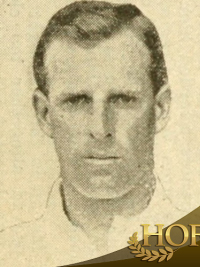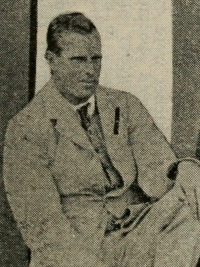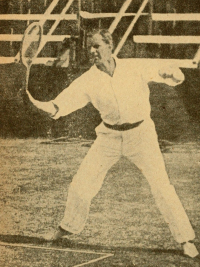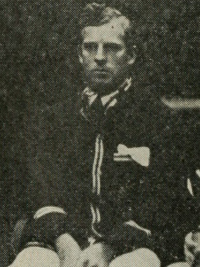Tony Wilding
Full name: Anthony Frederick Wilding
Nickname: Tony
Nickname: Tony
| Born | October 31, 1883 in Christchurch, New Zealand |
|---|---|
| Died | May 09, 1915 in Neuve-Chapelle, Pas-de-Calais, France |
| Class of HOF | 1978 |
| Plays | Right-handed |
| Bio | Wilding was the second child and the first son of Frederick and Julia Wilding. His father was a well-to-do lawyer in Christchurch, New Zealand. He was educated there at Mr Wilson's School in Cramner Square, then attended the Canterbury University College for six months before going to England in 1902 to enter Cambridge University, where he developed his tennis game as a member of the Cambridge University Lawn Tennis Club. In 1905, Wilding made his first Davis Cup appearance as part of the Australasian team and the following year won the Australasian Championship singles and doubles championships. Finishing his education, he was called to the English Bar in 1906. Between 1907 and 1909 he helped the Australasian team win the Davis Cup, and he won his second Australian Open in 1909, the same year he qualified as a Barrister and Solicitor at the Supreme Court of New Zealand. Focusing on his tennis game, he then won the Wimbledon singles title for four straight years between 1910 and 1913. In 1913 at Wimbledon Myers says that he played "the best game of his life", beating Maurice McLoughlin in three sets. In 1914 he narrowly missed winning his fifth in a row, losing in the 1914 finals to Norman Brookes. In addition, he won four doubles titles at Wimbledon. In 1914, he returned to Davis Cup play, leading the Australasian team to another championship. He missed the 1908 Olympics in London because of administrative bungling, but at the 1912 Olympics in Stockholm won a bronze medal in the men's indoor singles for Australasia. He won a unique triple in 1913: The World Hard Court Championship (Paris, clay) The World Lawn Tennis Championship (Wimbledon, London, grass) The World Covered Court Championship (Stockholm, indoor wood) These were all three of the official World Championships events (Major tennis titles) as designated by the International Lawn Tennis Federation (ILTF), at the time.(Note: The current 4 majors were only made officially so from 1924/1925). In 1914 Wilding retained his World Hard Court Championship title in Paris without losing a single set. At the outbreak of World War I, Tony Wilding joined the Royal Marines, serving as a Captain with the Royal Naval Armoured Car Division in the battlefields of France. Wilding lost his life at the age of 31 when he was killed in action on May 9, 1915 during the Battle of Aubers Ridge at Neuve-Chapelle, France. He had been dating and was about to marry Broadway star Maxine Elliott, a woman fifteen years his senior. Captain Tony Wilding was buried in the Rue-des-Berceaux Military Cemetery in Richebourg-L'Avoue, Pas-de-Calais, France. Wilding Park, the principal venue for tennis in Christchurch, New Zealand, is named in his honour. He was a leading tennis player in the world during 1909-1914. In 1950, Brookes compiled a ranking list of greatest tennis players and put Wilding fourth behind Bill Tilden and the Dohertys, and ahead of Budge, Kramer, Lacoste and Perry. The winner of six major titles in singles, and a player who could alter his game markedly to give himself the best possible chance against daunting adversaries, Tony Wilding stepped up boldly to win Wimbledon four years in a row (1910-13). Also the victor twice at the Australian Championships, he did not lose a match at that event during his career. A spirited man who thrived when competing in Davis Cup, Wilding led the Australasian squad to four triumphs in that forum. In 1978, he was named to the International Tennis Hall of Fame. |
| Misc | He also played for the Canterbury cricket team in the early 1900s where he played two first-class matches. He was a keen motorcycle (with sidecar) rider with many long trips in Europe, New Zealand and America. In 1908, he won a gold medal in a reliability trial from Land's End to John o' Groats. Several "mighty rides" (Myers) in Europe in 1910 included London to Lake Geneva and back, some 3000 miles (4800 km), including 350 miles (560 km) from Evian to Paris in one day. He ventured into poorly roaded places like Hungary and Serbia. Mr Anthony Wilding's form is well known here. I expect him to render a very good account of himself this season, as his tactics show a great improvement, and he is not now trusting so much to mere strength for the production of his strokes. When he gets his forehand a little more under command, it will be hard to beat. He has developed a puzzling American reverse twist service. (Source: P.A. Valle wrote this article in the 'Field' on June 3, 1905) |



